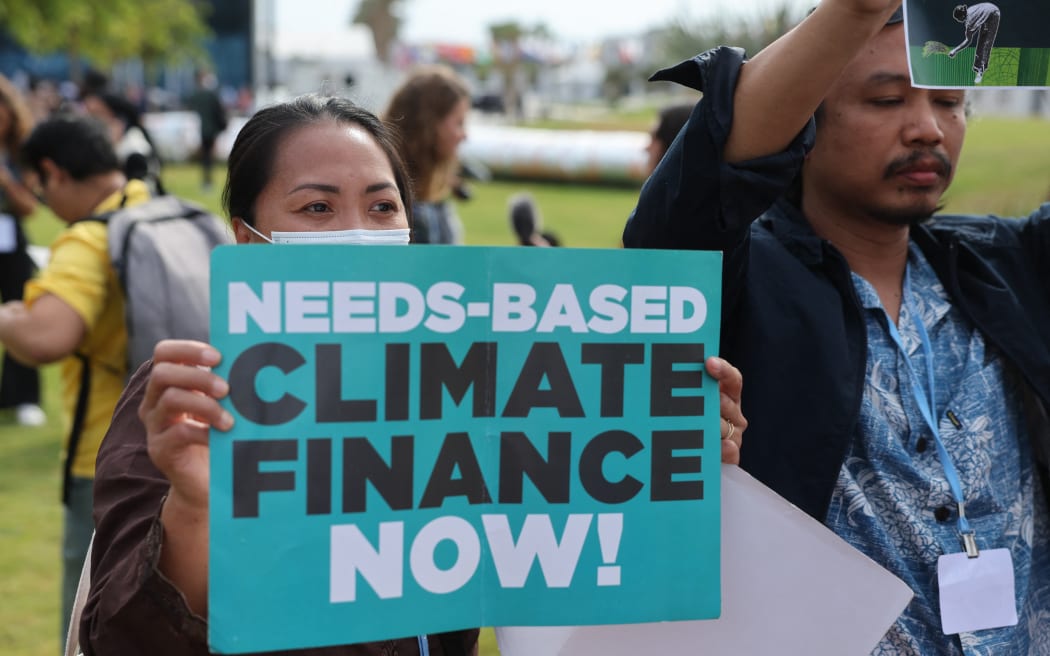
Climate activists protest outside the Sharm el-Sheikh International Convention Centre, during the COP27 climate conference in Egypt's Red Sea resort city of the same name, on November 17, 2022. Photo: AFP / Ahmad Gharabli
A study by two New Zealand researchers has found the global costs of climate change are being underestimated by billions of dollars a year.
Victoria University's Ilan Noy and Rebecca Newman of the Reserve Bank found greenhouse gas-related storms, floods, heatwaves, droughts and wildfires cost US$143 billion (NZ$172b) a year over the 20 years to 2019, and the damage was getting worse, reaching double that average (US$280b/NZ$483b) in 2022 (US figures in 2020 dollars).
They counted only the portion of the damage caused by climate change worsening the frequency of events, not losses that would have happened anyway.
The bulk of the cost was from people dying.
The study, published in peer-reviewed scientific journal Nature Communications, found almost 61,000 deaths were caused by climate change since the year 2000 - a big underestimate, according to Noy.
The lack of accurate, up-to-date death records in places such as parts of sub-Saharan Africa and South Asia meant it appeared as if no one died from heatwaves in places where "we know this is not true", he said.
The researchers also could not count lost productivity, despite it being a known effect, because that also typically was not recorded. Productivity goes down in regions damaged by extreme events, such as Hawke's Bay after Cyclone Gabrielle, but these indirect costs were not recorded in a central database.
The biggest known financial losses happened in the United States, mainly from dramatic storms.

Ilan Noy. Photo: supplied
Noy said New Zealand had a lot of events included in the tally per capita, because of our high concentration of researchers working in the small but growing field of attributing financial damage to climate change.
By contrast, large parts of the globe were under-represented because of a lack of scientific research linking extreme events to climate change and quantifying the added cost.
The loss of a life was quantified in the study as costing US$7m (NZ$12m), based on the average value assigned by the US and UK governments. Death was responsible for most of the costs, more than property damage. Economists recognised valuing a life in dollars was "odd", Noy said, but it allowed them to quantify both the cost of losing people before their time and the benefits of taking action to save people.
Noy said damages were accelerating, with 2022 coming in at double the 2000-2019 average.
Oxfam Aotearoa said the findings showed how far countries like New Zealand still needed to go to compensate poor countries for climate-related losses, which they have done the least to cause.
Climate spokesperson Nick Henry said the NZ$20m committed by the government at last year's global climate summit was useful to get things started, but not enough.
Wealthy countries did not have a great track record of paying up, he said, with only around a quarter of what was promised in climate finance by 2020 actually paid in grants. Much of the rest was in the form of loans, or not paid at all, according to an Oxfam analysis.
Compensation for loss and damage from greenhouse gas-fuelled disasters was separate from the finance for cutting emissions and adapting to climate change in developing countries which was already promised under the Paris Agreement, he said.
Countries had been negotiating how to manage getting money from wealthy nations and pay it to poorer nations for losses and damage.
The next big climate meeting will be held in Dubai, in November.





